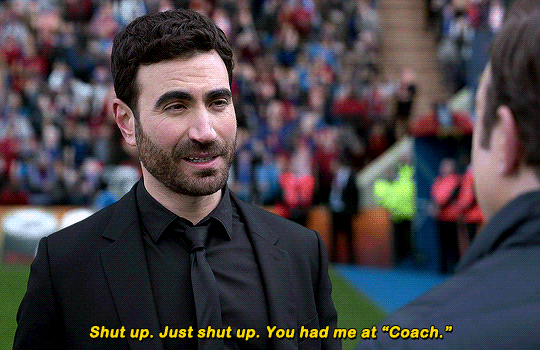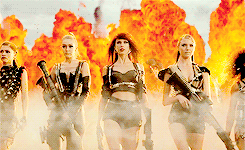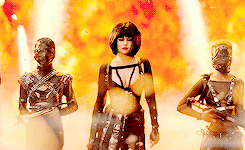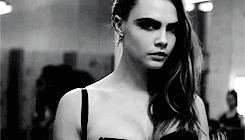I’ve written a few pieces for our site about a tall, blonde pop star named Taylor Swift throughout the years. I’ve reviewed her recent albums, discussed her “Bad Blood” music video, and even defended her against those who would shame or dismiss her. But now I’m writing this post-VMAs piece, mostly because I don’t have much to say about the awards themselves, but also because Taylor Swift continues to genuinely impress me as a human being. And rather than simply repeat that she impresses me, I'd like to actually elaborate on why.
So this is an open letter to Taylor, because I feel like we could be friends. And I don't know about you all, but I’m always in desperate need of more female friends who are genuinely supportive and kind-hearted and representative of the true values of feminism. It’s an open letter because even though I’ve never met Taylor and will probably never meet her, I feel like I know her. Maybe you do too. This letter is for you, also.
Dear Taylor,
Hey there. Should I call you Taylor? Tay-Tay? T-Swift? Maybe I’ll just stick with Taylor for now. I’m writing this letter mainly because I wanted to thank you for who you are. And as I’m sitting here, thinking about writing this out, it strikes me as sort of odd that this is even something I have to thank you for. Maybe that is because we live in a world where it’s so common to wake up every day and wear a persona as commonly as we would wear our jacket. It's just something that we do so often that we don’t even think twice before donning that persona before we leave our homes every morning. We’re all actors, in a way, I guess. But what I’ve noticed about you, Taylor, is that you’ve kind of started refusing to do that (in the most polite and genuine way possible). I think that so often we’re terrified to be who we really are around other people, especially if they’ve already put us on a pedestal in their minds and hearts. We don’t like to disappoint others. We don’t like to have our masks forcibly removed and our true selves beneath the personas revealed. We don’t like being vulnerable. It’s terrifying because it’s exposing; it's terrifying because people can see us and recoil in horror or run away. Because there we are – all of us. Our flaws laid bare and our feelings uncovered. It’s gut-wrenching to be real with other people. And it's always a risk. It really is.
So that’s why I have to thank you: thank you for showing everyone that it’s scary to be vulnerable but that being real with others is what makes us human and it makes us more relatable to other people and is what will ultimately make us better. Recently, I saw a video of the introduction you gave at your 1989 tour before “Clean.” I watched it on my phone, sitting on the floor of my living room and I started to cry into my chicken lo mein. And I couldn't stop. So I wanted to take this opportunity to thank you for making me cry. Thank you for saying the things that other people are too jaded or scared to say. Thank you for reminding us all that who we are is often defined by what we believe about ourselves, for better or for worse. I needed to hear that and I feel like we all need to hear that, multiple times every single day of our lives.
I’m writing this open letter mainly because of what you’ve done in the media recently. You made a mistake on Twitter and you made amends. I’ve been there. You’ve been scrutinized by the media for years because of your romantic life. I… okay, admittedly I don’t have experience at all with that aspect of your life. But regardless of the situation you have been thrust into or encountered on your own, you always managed to handle these things with grace and poise and tact that made me think you’re a lot wiser than your years might suggest. But most recently, you’ve done some things that have endeared you to me even further. You’ve chosen to share your spotlight. I mean, you’ve always done this, but you’ve now actively chosen to share it with women – all kinds of women. And your feminist squad is the kind of squad anyone should be proud to join.
Fun fact: I’ve been referred to by people as “Taylor Swift” before. Once, it was by a guy who did not mean it as a compliment but an insult. This guy was cute and I liked him a lot and yet that was (among a few other things) pretty much a deal-breaker for me. More recently, though, I’ve been referred to as “Taylor Swift” and it’s been used as a compliment. So let me tell you what people mean when they say that. They use your name as something that is synonymous with “kind” and “generous” and “good-hearted,” all of which you are. You’re not a celebrity who is seeking attention and fame. You’re not someone desperate to be noticed in the spotlight, eagerly waving your hands around like a toddler begging: “Notice me! Notice me!” You’re comfortable in your own skin and I’ll venture to guess that you didn’t always feel that way and you probably still don’t, in some moments. Because we’re all human and we're women. Insecurities follow us around like annoying little mosquitoes we just can't stop from biting us. What people mean when they use your name as an adjective in a positive way is that the person being talked about and complimented exudes selflessness. You deserve a lot of credit for all the work you do, between writing and playing music, touring endlessly, and shooting videos and interviews among all kinds of other demanding things. You have every right in the world to be selfish given the life you lead and the schedule you must have and the lack of sleep you must endure during tours.
But you don’t choose selfishness. You don’t use your fame as an excuse; you don’t brandish it as a weapon. Instead, you could easily take the stage at every awards show and talk about your success and yourself, or at the very least, keep the microphone in your hands. But you choose to step aside and give your platform to others – whether with Joseph Kahn or seventeen amazing other women. You don’t let your status or your success become a way to distance yourself from others, but as a way to bring yourself closer to us.
I suspect you’re a great friend. And a daughter. And a sister. And you’ll be a great godmother. Because from all that I’ve seen of you, I have no reason to believe anything otherwise. See, it’s one thing to surround yourself with women and call yourself a “feminist” – it’s another for women to willingly gravitate toward YOU. That’s the marker of a true feminist, in my opinion. Do women want to be around you or do they keep themselves at a distance? If the latter, you have to ask yourself why. But if the former, you don’t need to question whether you’re doing something right. You are. You, Taylor, are a feminist. And you’re this way, I believe, because you’ve learned the value that can only come through genuine female friendships and through co-existing in those valuable female friendships. Anyone can surround themselves with women and boast about how much of a feminist they are. Anyone can write feminist diatribes online. Anyone can reblog quotes on Tumblr or retweet articles on Twitter. But I know women who claim to be feminists who delight in cutting other women down. I know women who claim to be feminists who revel in the fact that they are always right, all of the time. I know women who claim to be feminists who can’t hear the opinions of others over the sound of their own voices.
I've never met you and even I know that you’re not that kind of person. You’re not a woman who claims to be a feminist and then turns around and hangs other women out to dry. You invite them into your life – into your home, into your celebrations, and – most importantly of all – into your success. That’s not something that would be easy for some people to do, honestly. But the fact that you share everything with women makes them draw closer to you. The ones who stick around, matter, Taylor. And I’m sure you know this already, but the ones who don’t matter – those superficial friends – will make themselves pretty clearly evident in your life. You’re a lot like one of my best friends, you know. She used to surround herself with a lot of guys and a lot of relationships. And there is nothing inherently wrong with having a number of boyfriends or dating. At all. But I think she recognized that there is something fundamentally lacking in romance with a man that you get from a platonic female friendship. I assume you’ve learned that, too: love is so very important in life, but love in female relationships is one of the foundations that we need to build our characters, as women, upon.
Okay. The bottom line here is that I feel like I know you and I’m friends with you. Is that strange? Even though you’re a songwriter and I mostly write poems and articles and the occasional short story, I feel like we’re connected in that sense. Writers know these things about one another. Your music has gotten me through some of the most difficult periods of my life. (You and Demi Lovato got me through some thorny romantic hurdles, let me tell you.) And what you’ve managed to do as a writer is inspiring. You’ve taken your personal story and invited us into it, like it was a warm, cozy cottage complete with a crackling fire, a warm blanket, and fresh cinnamon sugar cookies. You’ve not just invited us in though – you’ve allowed us to stay there. You’ve taken your home and asked us to make it ours as well. So when you write, you write your experiences as if we’ve been there with you, too, the entire time, listening right by your shoulder. You’ve taken an intimate moment and made it even more intimate. You’ve allowed us all to tether our pain to yours, our joy to yours, and our hope to yours. That is truly the mark of an amazing writer: to take something personal and to make it universal is no easy feat.
So that’s why I feel like I know you. It’s because you feel like a friend who’s been with me for years, as constant a presence as my roommate or my childhood best friends are. I know it’s weird to say that a person feels “real” to them because yes, obviously you’re a real person. You are living and breathing. There’s no doubt about that.
But the reason people connect with you, Taylor, and the reason that they love you and sell out your shows and vote for you in awards and celebrate you online is because you feel like you’ve been our friend all along.
Maybe you have.
- Jenn












